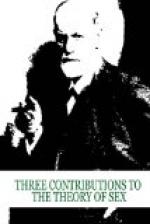After watching for ten years the reception accorded to this book and the effect it has produced, I wish to provide the third edition of it with some prefatory remarks dealing with the misunderstandings of the book and the demands, insusceptible of fulfillment, made against it. Let me emphasize in the first place that whatever is here presented is derived entirely from every-day medical experience which is to be made more profound and scientifically important through the results of psychoanalytic investigation. The “Three Contributions to the Theory of Sex” can contain nothing except what psychoanalysis obliges them to accept or what it succeeds in corroborating. It is therefore excluded that they should ever be developed into a “theory of sex,” and it is also quite intelligible that they will assume no attitude at all towards some important problems of the sexual life. This should not however give the impression that these omitted chapters of the great theme were unfamiliar to the author, or that they were neglected by him as something of secondary importance.
The dependence of this work on the psychoanalytic experiences which have determined the writing of it, shows itself not only in the selection but also in the arrangement of the material. A certain succession of stages was observed, the occasional factors are rendered prominent, the constitutional ones are left in the background, and the ontogenetic development receives greater consideration than the phylogenetic. For the occasional factors play the principal role in analysis, and are almost completely worked up in it, while the constitutional factors only become evident from behind as elements which have been made functional through experience, and a discussion of these would lead far beyond the working sphere of psychoanalysis.
A similar connection determines the relation between ontogenesis and phylogenesis. Ontogenesis may be considered as a repetition of phylogenesis insofar as the latter has not been varied by a more recent experience. The phylogenetic disposition makes itself visible behind the ontogenetic process. But fundamentally the constitution is really the precipitate of a former experience of the species to which the newer experience of the individual being is added as the sum of the occasional factors.
Beside its thoroughgoing dependence on psychoanalytic investigation I must emphasize as a character of this work of mine its intentional independence of biological investigation. I have carefully avoided the inclusion of the results of scientific investigation in general sex biology or of particular species of animals in this study of human sexual functions which is made possible by the technique of psychoanalysis. My aim was indeed to find out how much of the biology of the sexual life of man can be discovered by means of psychological investigation; I was able to point to additions and agreements which resulted from this examination, but I did not have to become confused if the psychoanalytic methods led in some points to views and results which deviated considerably from those merely based on biology.




